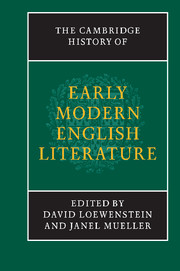Book contents
- Frontmatter
- Introduction
- 1 Modes and means of literary production, circulation and reception
- 2 The Tudor era from the Reformation to Elizabeth I
- 3 The era of Elizabeth and James VI
- 4 The earlier Stuart era
- 15 Literature and national identity
- 16 Literature and the court
- 17 Literature and the church
- 18 Literature and London
- 19 Literature and the theatre to 1660
- 20 Literature and the household
- 5 The Civil War and Commonwealth era
- Chronological outline of historical events and texts in Britain, 1528–1674, with list of selected manuscripts
- Select bibliography (primary and secondary sources)
- Index
- References
15 - Literature and national identity
from 4 - The earlier Stuart era
Published online by Cambridge University Press: 28 March 2008
- Frontmatter
- Introduction
- 1 Modes and means of literary production, circulation and reception
- 2 The Tudor era from the Reformation to Elizabeth I
- 3 The era of Elizabeth and James VI
- 4 The earlier Stuart era
- 15 Literature and national identity
- 16 Literature and the court
- 17 Literature and the church
- 18 Literature and London
- 19 Literature and the theatre to 1660
- 20 Literature and the household
- 5 The Civil War and Commonwealth era
- Chronological outline of historical events and texts in Britain, 1528–1674, with list of selected manuscripts
- Select bibliography (primary and secondary sources)
- Index
- References
Summary
In 1603, the Scottish King James VI inherited the throne of England. The following year, he issued a proclamation, changing his title from ‘King of England and Scotland’ to ‘King of Great Britain’. James wanted to unite more than just the crowns of the two kingdoms. His ultimate goal was to create ‘a united British nation’. He introduced a new gold coin, called the ‘unite’ (unit), which featured an inscription declaring ‘I will make them one nation.’ The English and Scots, he argued, were currently ‘two nations’, but both inhabited ‘one Ile of Britaine’, and they were ‘alreadie ioyned in vnitie of Religion and language’. In time, he hoped, the two nations would become one. The ultimate political allegiance of all his subjects – English, Scots, Welsh and Irish – was to himself. It made sense for countries that were already united by their political and religious loyalties, and by geography and language, to enter into still closer union. Writing in favour of the Union, the Scotsman Robert Pont found it remarkable that his country men and the English had so long been mortal enemies. In times past, he argued, God had ‘armed these nations with mallice and hatred one against another’ in punishment of their popish idolatry. Since the Reformation, however, God had changed his attitude towards the two peoples, and if they refrained from angering him by sinning too seriously, it was now possible for them to live together as ‘one commonwealth … in a lovelie and perpetuall peace’.
- Type
- Chapter
- Information
- The Cambridge History of Early Modern English Literature , pp. 457 - 486Publisher: Cambridge University PressPrint publication year: 2003



